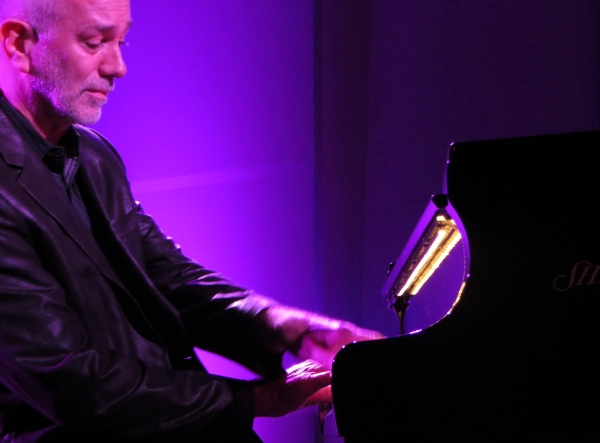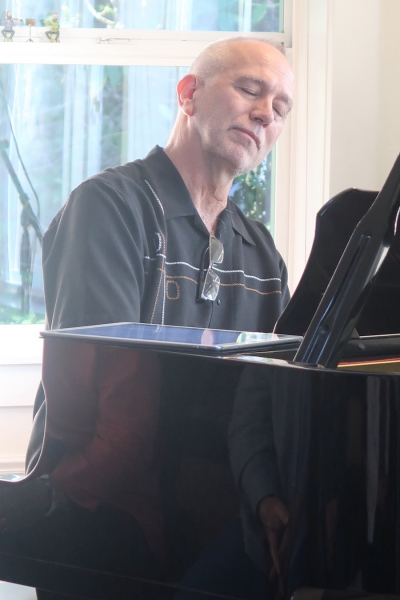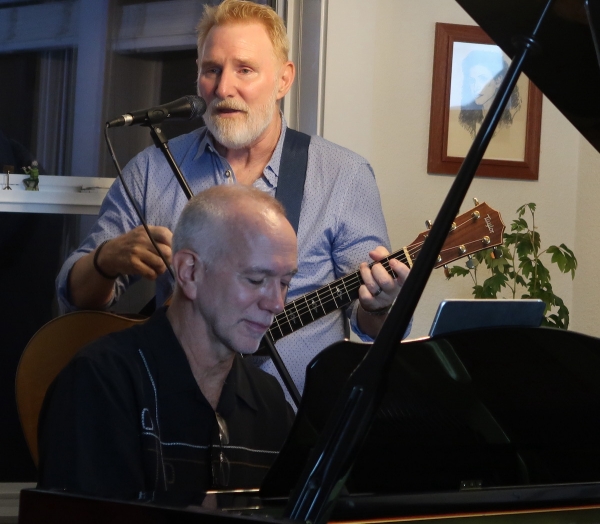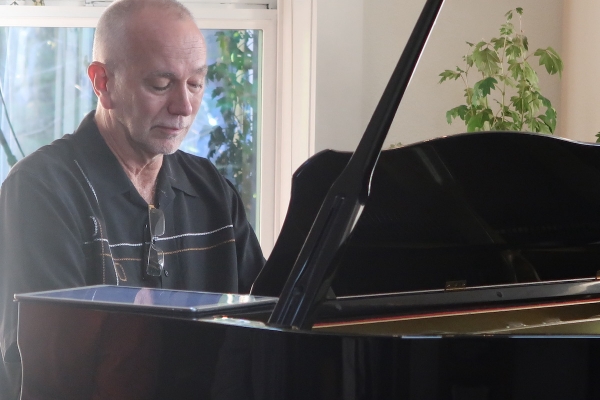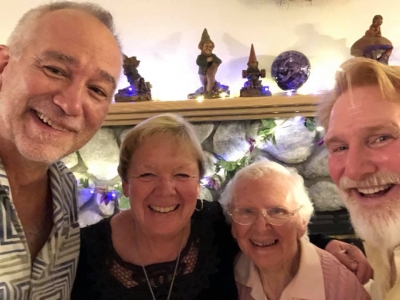My first interview with Dan Chadburn was back in January 2013. I had reviewed two of his albums for
Wind and Wire magazine in the late 1990's and loved them both. Dan was one of the very generous artists who contributed music to
The Heart Aid Project to raise fund for the victims of 9/11, and then I didn't hear from him again for a very long time. He has released seven solo piano albums since 2012, and has performed fund-raising concerts with his husband, Tom Nichols, in my house concert series since 2014, both here in Florence, OR and streaming online, all but one for our local Oregon Coast Humane Society. Dan and Tom are two of my favorite people on the planet and have become like family, so it came as a shock to realize we hadn't done an interview in such a long time. Dan very recently released
Always, an incredibly beautiful and soulful solo piano album, so we talked about that music as well as other things in this interview, which was done via email in August 2022.
KP: Wow, Dan! We need to catch up!
DC: Hi Kathy! It’s so good to sit down with you again to share and catch up! It is really hard to believe that our last interview was in 2013!
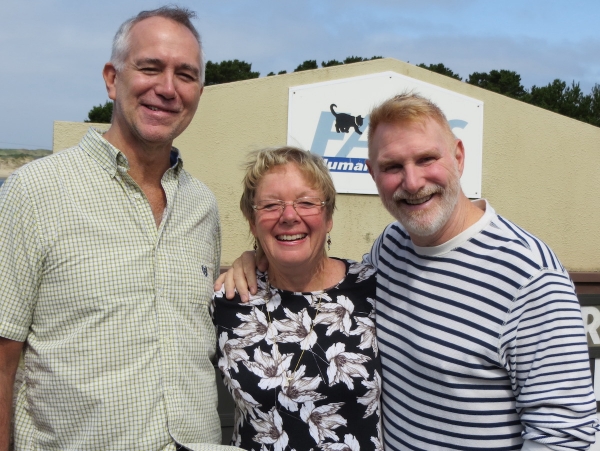
After Dan and Tom's first concert in Florence, OR August 2014.
KP: We met when you and Tom Nichols did your first house concert here in August 2014 as a fund-raiser for our local Oregon Coast Humane Society, and you've done benefit concerts every year since then with all but one for OCHS. Thank you! The past couple of years, the concerts have been streamed online, reaching a much bigger audience and raising lots of dollars to benefit our local animal shelter. Thanks so much for your generosity! Are we going to do another concert this year?
DC: Tom and I have really enjoyed our annual trips to the Oregon Coast to see you and your mom, and to work together through your home concerts to benefit the animals at the Oregon Coast Humane Society. We’ve really missed doing that in person these past couple years because of the pandemic but hope that we can do it again soon.
As far as doing another streaming concert, we would love to! It will likely have to wait until early 2023 though, in that Tom and I have just begun a major renovation of our house. To avoid all the dust and debris, our piano has actually been moved next door where our very kind friend and neighbor, Sonny, has graciously offered to keep it in his living room while our house gets renovated. Once we’re “back up and running” (and the piano is back in our living room), we would love to do another virtual concert with you for OCHS!
KP: Yes! Let's plan on it!
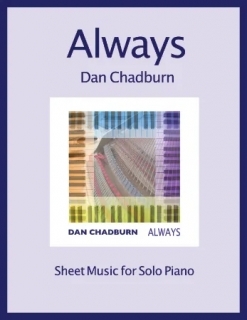
Click on covers to go
to Kathy's reviews.
You very recently released a solo piano album called
Always, and I think it's your best album yet. Tell us a bit about it.
DC: Thank you, Kathy! I’m so glad you like the album! Always was recorded this past April in Sedona at Joe Bongiorno’s Piano Haven Studio. With the exception of one piece that was created in the studio, each of the tracks on the album was composed prior to the recording sessions. The pieces vary in style, from neoclassical to cinematic, from light and dancelike to quiet introspection. The album’s title, Always, represents the infinite promise of faith, hope, and love. It’s my hope that the album helps listeners celebrate the unfailing resilience of the human spirit, the steadfast courage of the human heart, the eternal existence and mystery of the human soul, and the remarkable, spiritual synchronicity of them all.
KP: You have recorded your last few albums at Joe Bongiorno's Piano Haven Studio in Sedona, AZ, and Joe's incredible Shigeru Kawai seems especially well-suited to your music. Have you established a special bond with that piano?
DC: I’ve played many pianos over the years. Joe’s Shigeru Kawai is certainly among the very, very best. It’s particularly good for playing music that is soft or even pianissimo, in that its hammers respond so well to even the slightest depression of the keys. It allows each note to be heard, no matter how quietly or delicately it's played.
Pianos sometimes have noticeable differences in the quality of tone between their individual registers. Sometimes a piano’s upper register notes might sound a little thin (or even shrill) in spite of having a lower register whose bass notes are rich and resonant. There isn’t a single note among the 88 keys on Joe’s piano that doesn’t sound nice. It has a beautifully consistent and gorgeous sonority from the lowest note to the highest. It’s an amazing piano.
KP: You have always been incredibly good at improvising, and one of the pieces on the album, "Sacred Breath," was improvised in the studio and recorded directly onto the album. How do you relax and focus enough to just let the music flow out with so much emotion and yet stay so cohesive?
DC: I’ve always loved to improvise. I was also very fortunate to have toured for a couple years out of college with two different music groups that gave about 300 concerts each year. And, because the groups were ministry-related, the concerts were, for the most part, in church sanctuaries. As regular church services often do, the concerts would typically begin with a piano prelude, so I had many, many opportunities to improvise. Those concert settings years ago helped me become very comfortable with closing my eyes, letting go of all distractions, and creating in the moment.
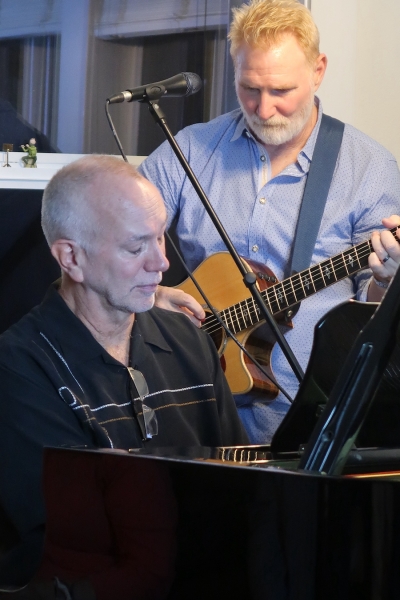
Dan and Tom at Kathy's 2019.
KP: Since so much of your music is based on improvisation, do you record every time you sit down to play or can you remember what you've played?
DC: Oh, how I wish I could, but I have a horrible time remembering what I’ve played. I even had a hard time memorizing repertoire in college as a piano major.
The improv process for me is a little different though. When I improvise, I typically close my eyes, which helps me shut out all distractions, and then I just let my hands go and play. It actually works best when I’m thinking of nothing, including the notes I’m playing.
If I turn on my iPhone to record (as I did with the improvs that were the basis for “The Wishing Well” and “Uncertainty”), or if I play something into a midi recorder (as I did with the piece that became “Turning Point”), I’m able to later transcribe those songs to play them again — in spite of my awful memory! I’m grateful for iPhones!
KP: A lot of composers are! Okay, back to Always!
What is the piece "Uncharted Waters" about?
DC: “Uncharted Waters” was composed on June 27, 2020. Centered in F# minor, with a few scattered glimpses of A major, its changes of meter represent the enormous challenges that we all face in today’s world. So many ever-changing unknowns, each and every day, compelling us to adapt, so as to continue moving forward.
KP: "Uncertainty" and "Wishing Well" were both composed in April 2020 while you had Covid-19. What was going through your mind as you wrote the music for these two beautiful pieces?
DC: Tom and I both got Covid-19 during the second week of March 2020. As millions of others who have had it would agree, to put it mildly, it was not fun. I felt the sickest I’ve ever been in my life and it lasted for many weeks. I’m grateful, however, that we were also very lucky. Our cases were moderate compared to some; we didn’t need to be hospitalized. So many others in those early days of the pandemic, prior to the availability of a vaccine, were hospitalized and had to face the virus alone. I can’t even imagine how difficult that must have been for so many who got sick and for their loved ones who had to say goodbye, not knowing if they would ever see each other again. So sad and heartbreaking.
By the middle of April, I was beginning to feel a little stronger, so on April 15th, I sat down at the piano, turned my iPhone’s video camera on, and just played. That improv would later become the basis for “The Wishing Well” on the new album.
I posted the improv to Facebook that same day.
There is a significant difference in tempo and character between the original improv and “The Wishing Well.” Not unlike how I was feeling in the moment, the original improv is quite slow, whereas there is a more robust energy heard in the album’s track.
About a week later, I set up my iPhone’s video camera again and recorded an improv that became the basis for the piece, “Uncertainty.” I titled the improv, “Working Through Uncertainty” at the time, and
posted it to Facebook on April 21, 2020.
Much like “The Wishing Well,” the tempos within the improv are somewhat slower than those on the album’s track. The improv also contained a thirteen measure introduction at the beginning which was removed to shorten the duration of “Uncertainty” on the album.
Covid has obviously been very difficult for everyone worldwide. While these two pieces were written during my own struggle with Covid, I recognize that others’ struggles with the virus have been far worse than my own. One of the most frightening aspects of this virus is the uncertainty of not knowing how or to what degree it will affect you or your loved ones next. That can be very scary. My hope and wish is that Covid will soon be behind us. The world has certainly suffered enough.
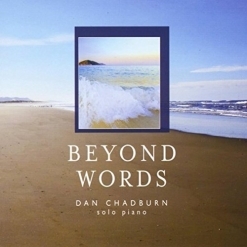
Click on covers to
go to Kathy's reviews.
KP: I couldn't agree more!
It's always a thrill to see that a piece you improvised/created in a house concert here made it onto an album! The closing track on Always, "Final Curtain," is one of those, and it is so beautiful! I'll have to go back through my video of the concert and view its birth! Do you remember what was suggested at the time to build the piece on?
DC: Your house concerts are the best, Kathy! Your audiences are always so wonderful and the love that’s present in the room always allows creative energy to thrive. Thank you!
As far as “Final Curtain” goes, as I sometimes do during a concert, I asked members of the audience at your house to join me in creating an improvisation together. That process involves asking three different people in the audience to each choose an answer to a different multiple choice question.
The first person was asked to name a letter of the alphabet, anywhere from A to G. The response was “E.” Then I asked a second person to choose one of the three words: “flat,” “natural,” or “sharp.” The person replied, “sharp.” Finally, I asked a third person to choose either the word “major” or the word “minor.” The person responded, “major.”
At that point, I then explained that the three in the audience had just collectively selected the “key” for the improvisation: “E sharp major.” I remember a few of the other audience members laughed aloud; they knew that E sharp major is NOT a common key! In fact, spelled out, its ascending notes in the scale are: E sharp, F double sharp, G double sharp, A sharp, B sharp, C double sharp, D double sharp, and E sharp.
That’s a LOT of sharps!
The good news is that the enharmonic equivalent scale for E sharp major – where the notes sound the same but are “spelled” differently – is F major. Even better news, F major has only 1 flat!
Once we, as an audience, acknowledged that, we closed our eyes, took a few deep breaths together, and “Improvisation in E# major” was born.
This improv was later transcribed, rehearsed, and then recorded on the Always album as the closing track, “Final Curtain.”
KP: How or why did you choose the classic folk song, "O Shenandoah," to be on the album? I just love your arrangement!
DC: “O Shenandoah” has always been one of my favorite folk songs. I remember singing it for the first time as a kid in grade school choir and being moved by the beauty of its lyrics and the contour of its simple yet rich melody. I decided to do an improv based upon it for the Oregon Coast Humane Society’s virtual concert last year. I then took that improv and reworked it a bit for release on the album, most notably adding a left hand accompaniment to the improv’s initial statement of the melody in the right hand. I’m glad you like the arrangement, Kathy!
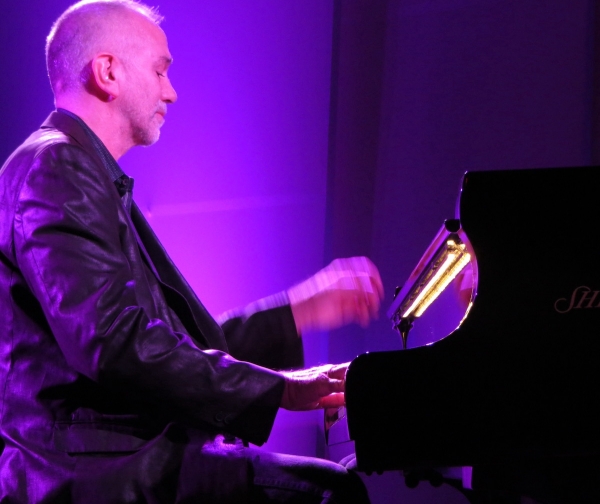
Dan at Whisperings in 2018
KP: "Turning Point" dates back to 2011 and is really powerful emotionally. Why so long between the creation of the piece and recording it?
DC: “Turning Point” – or “1039 New Song” as it was first auto-titled by my Kurzweil 2600 when I played it into its midi recorder – was composed on Sunday evening, November 27, 2011 in Virginia, after I returned home from visiting family in Oregon over Thanksgiving. Our dear friend and fellow musician, the late Peter Fox, was very sick at the time and had entered the hospital a couple days before. Tom and I both agreed it was best for Tom to stay back in the Washington, DC, area to be present for Peter so I made that year’s Thanksgiving trip to Oregon by myself.
When I returned that Sunday, Tom suggested that I create a song for Peter. So I sat down at the Kurzweil and began recording. The music that poured out that day was more classical in theme and form than much of my piano music. It would be the first of two songs that were inspired by Peter, the second one being, “Peter’s Theme” on my Nocturnes album, composed shortly after Peter’s death in January, 2012.
In the more than ten years since it was composed, it’s been “sitting on the shelf” waiting for the right project to find it. The Always album seemed like the perfect fit.
Until a few months ago, its transcription title still read, “1039 New Song.” When Tom and I began titling tracks for the album, Tom suggested “Turning Point.” We both liked the title and settled on it.
Musically, the piece is full of turning points. The opening fourteen measures, for instance, have short melodic motifs in the right hand that ascend and then immediately turn the other direction in pitch. The piece is comprised of distinct sections that turn from one mood to another, one key signature to another.
The title, “Turning Point,” has personal significance for me. While the piece was composed in November, 2011, I had no idea at that time that I would soon become excited again to record and release music. For various reasons - some very valid, and others, in retrospect, quite foolish - I had not released any music since my second album, Reflections, in 1999. And while “New Song 1039” didn’t immediately get released after it was created, other music I began to write and record in early 2012 did. In the ten years since, I’m grateful to have released seven additional solo albums, while also co-producing with Tom many more albums by other artists.
“1039 New Song” represents that “Turning Point” in my life when I became focused again on creating and sharing music with others.
KP: That's a great story! Thanks for sharing!
We should probably mention that the sheet music for the Always album is also available from your website as PDF downloads of the full book as well as individual pieces and as printed books. John Zechiel and you did the transcriptions and did a great job! I also reviewed it as well as the recording.
DC: I’m glad you like the sheet music, Kathy! Thank you, too, for reviewing it! John Zechiel is absolutely amazing at what he does. At the risk of getting too technical here, I’m able to transcribe onto paper anything that I record as a midi piece; the notes and their rhythms are all right there in the midi data. “New Song 1039,” or “Turning Point,” was one such piece. John, on the other hand, has a talent I don’t have, which is to listen to a complicated audio recording and hear every single note that is being played in the two hands on the piano — and then accurately transcribe that recording onto sheet music.
I cannot recommend
John Zechiel more highly!
KP: I've proofed a lot of John's transcriptions and he is always a joy to work with - and extremely accurate!
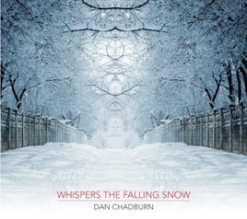
Click on album covers to
go to Kathy's reviews.
Although you grew up in Oregon, you have been on the East Coast for quite a number of years. Last year, you and Tom moved from Virginia to Fort Lauderdale, Florida. How do you like it there?
DC: Yes, Tom and I sold our home in Virginia last year and moved to Fort Lauderdale, FL. We live in a neighborhood called South Middle River which is immediately adjacent to Wilton Manors, a welcoming and affirming community. It’s a wonderful place to live and the Florida sunshine can’t be beat!
KP: Is Tom having to commute to New York City for his job or is he mostly able to work from home now?
DC: During the pandemic, Tom worked primarily from home in Florida. As restrictions have been lifted, we are traveling a bit more now, including up to New York City. Tom works for a philanthropic foundation based in Manhattan that funds both great ape conservation and social justice/LGBTQ+ organizations. The foundation and its staff do incredibly important and marvelous work. I’m so very proud of my husband. Both as a musician and as a COO in the foundation world, Tom has dedicated his life’s work to making this a better world for all.
KP: He's amazing and truly an inspiration!
You have composed several pieces that are tributes to various pets. Do you have any canine or feline family members again?
DC: As you well know, Kathy, pets are such a beautiful gift and an important part of our lives. We’ve been blessed in the past to be the parents of an amazing cat named Kal, and three beautiful dogs named Kya, Kaly, and Molly. While each has since crossed the Rainbow Bridge, we remember each one for their unique personalities and the joy they brought into our world. Tom and I look forward to welcoming a dog or a cat, or both, into our home again when the time is right. In the meantime, we both believe that, more often than not, pets choose us. Because of that, neither one of us will be surprised if, one day in the future, a dog or cat -- or perhaps even a bonded pair – “shows up at our doorstep.” We’ll be ready.
KP: Other than being really sick early on, how has the Covid pandemic affected your music career?
DC: One effect has ultimately been a positive one for me. When the pandemic hit in March, 2020, we of course were all suddenly restricted in our ability to travel and to do routine things outside of the house. This actually gave me time to sit down at the piano, to play and to practice and to compose, in ways that I hadn’t done in a long, long while. I believe my work on Always benefited from that.
The pandemic also allowed Tom and I to spend a great deal more time together, both of us working from home. He’s remarkably inspiring as a fellow musician. He “gets me” and also understands the creative process so well. I’m grateful for the many extra hours we were given together because of the pandemic to support and inspire each other through music.
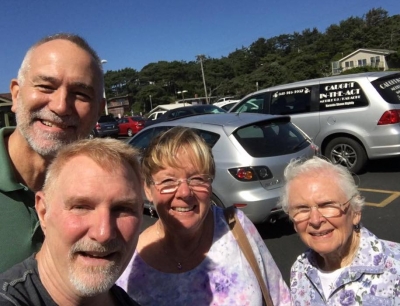
Dan, Tom, Mom and me
Both of us are inspired by the work of other artists too. Tom and I love to go and hear local artists performing live music, and to be part of an audience that offers support and encouragement. Obviously, that all shut down when Covid arrived. We’re grateful that most of the local clubs and restaurants where we live have survived and are open once again, featuring these musicians on a regular basis. It’s so important to support them; for many, their livelihoods depend upon it.
KP: Have you done much live performing the past two years?
DC: Tom and I actually performed our first live concert since the pandemic just this past month in Federal Way, Washington, a city just south of Seattle. A dear friend of mine from college is the pastor of a Lutheran church there. We’ve done several concerts at her church now, but this was the first one in three years because of Covid-19. It was wonderful to see Pastor Karen and her family again, as well as other friends at the church and to share music in person again. We’ve missed having that opportunity.
KP: I'm hoping to be able to start hosting concerts again soon too!
If you could have any three wishes, what would they be?
DC: My first wish would be to sit down for a meal with three of my former teachers who have since passed on, to once more tell them “thank you!” for the positive influence they had on me, both as a musician and as a person. Maxine Martin. Calvin Knapp. Phyllis Quanbeck. I was so very, very lucky to have known each of them.
On a more humorous note, my second wish would be that I could learn to love spiders, or at the very least, be able to “co-exist” with them without psychological trauma being involved. As it stands right now, if I see a spider in the house anywhere near bedtime, the lights will stay on all night until that spider is “eliminated” or “relocated” outside. The fact that something so small in size can be so terrifying is actually quite funny, even to me.
My third wish would be for the young people in our world today, a generation that faces some daunting challenges in the years ahead. May they have the natural resources they need on this earth to live and to thrive, and may they have unconditional love and support from their parents and grandparents, their teachers and mentors, their faith leaders and counselors, helping them to grow with confidence in themselves, each one recognized and celebrated for their own unique gifts to this amazingly diverse world in which live.
KP: Very inspiring, Dan! Is there anything else you'd like to talk about?
DC: I just want to say thank you again, Kathy, for the chance to catch up through this interview, talk a little about the new album, and most important, thank you for your friendship. You are such a gift and amazing friend to all of us in the solo piano community and beyond.
Much love to you and your Mom, from Tom and me!
KP: Thanks so much, Dan!
Many thanks to Dan Chadburn for taking the time to do this interview! For more information about Dan and his music, be sure to visit
his website and his
Artist Page here on MainlyPiano.com.
Kathy Parsons
August 2022

